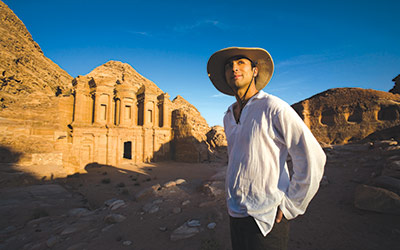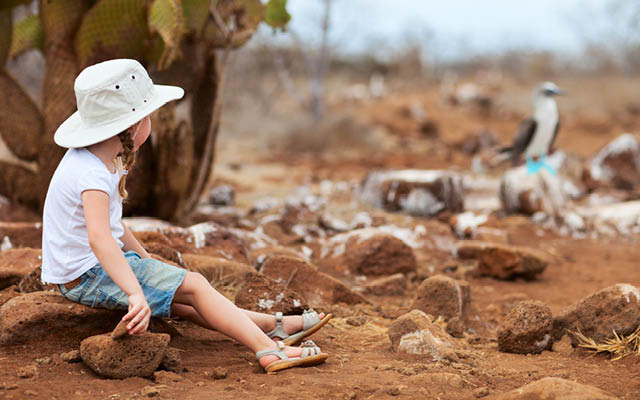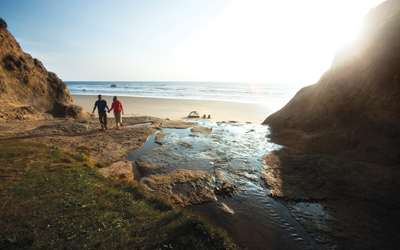Face pressed to the window of a train speeding through southern France, one hand cradling a chocolate croissant as I watched sunflower fields racing past under a sapphire-blue summer sky, I suddenly sensed that something was different. Something had changed since I’d boarded a plane two weeks before in San Francisco. Had it started at the Louvre? On that Breton beach where I hiked 10 miles one day? At the farmers’ markets where I chatted with cheese makers in halting, six-weeks-of-adult-school French?
Somewhere, somehow it had arrived: a certain lightness, like having recovered from an illness or as if the sun had come out after a long spell of rain. Zooming past gray-stone farmhouses, I realized what it was. By some baguette-scented, train-track-soundtracked magic, I felt like a different person. Back home in my everyday life, I was often self-critical and full of self-recriminations; now I suddenly felt neither fearful nor regretful, but simply, mercifully OK.
And in that charmed moment I knew it was all down to traveling. With its challenges and marvels, its foreign menus, and mysterious strangers, being away from home for a while had miraculously made me feel refreshed and renewed.
What Happens on the Road
Some of the reasons for this newfound levity are obvious. Seeing more of the world makes us feel more worldly. At certain hotels, we’ll be pampered. Memories of feats such as walking the Great Wall or climbing Half Dome are permanent “self-esteem souvenirs.” Traveling helps us connect with our true selves and true desires. And while traveling, we can test-drive personal changes we’ve been pondering. Want to become a hot-sauce connoisseur, get a buzzcut, or call yourself Celeste? Where better to start than amid landscapes you’ve never seen before, with people you might never meet again?
Every trip, from a globe-circling saga to an overnight campout, can be an esteem-building achievement because it proves that we are capable of navigating unfamiliar territory. And every trip offers opportunities to discover and exercise skills that might otherwise have remained hidden. You might learn, for example: I’m good at packing, finding lodging, navigating, bargaining, communicating, firewalking, choosing wines. Or: I’m flexible, resourceful, strong, spontaneous, adventurous, courageous, fun.
“It’s always challenging and rewarding to get out of our comfort zones, whether we’re visiting a city as user-friendly as Paris or as exotic as the Himalayan hamlet of Phortse,” says Jeff Greenwald, author of six travel books and executive director of the nonprofit resource EthicalTraveler.org. “Something deep within us recognizes the value of being able to communicate effectively with a kebab vendor in Istanbul. It makes us realize we can live our lives anywhere, that we’re a part of the big world and not confined to our own tiny piece of it.”
Recent studies show that travel elevates mood in measurable ways. It makes people happier, more optimistic, more grateful, and more respectful of others. An analysis of the language used in tweets found that the farther we travel from home, the happier we become.
Still another study found that taking a few vacations per year brings more happiness than winning $80,000 in the lottery. Positive memories of mastering challenges we enjoy can powerfully sideline low self-esteem’s mental tape-loops of dread, regret, and negative self-talk.
“Self-esteem is a practice that begins with awareness,” says lifestyle expert Petra Kolber. “One of the pillars of self-esteem is to live consciously, and when we travel we tend to be more conscious and aware of what is going on around us.”
Traveling also helps us “get out of our own disruptive thought patterns simply by moving away from our regular environments,” Kolber says. “We have the chance to get curious and explore our new surroundings —and that is also a great tool for lifting self-esteem.”
Decades of travel have shaped Greenwald’s sense of self as well.
“Just being courteous and friendly, and winning the confidence and respect of people in foreign lands, is a real endorphin rush,” he says. “While trekking in Nepal in 1979, I hit my head on the door frame of a tiny inn. I whacked it so hard I saw stars; the locals were afraid I’d been seriously hurt.
“But I made a joke in the local language — literally, ‘Tall man, short door’ — and they exploded with glee,” he remembers. “Word of the American ‘joker’ on the trail followed me from village to village, and I was the toast of the Annapurna Range. That felt good. As they say, if you’ve made it in Tatopani, you can make it anywhere.”
How to Travel in Place
If travel lifts self-esteem, how can we keep it from plummeting when vacations end?
One way is by keeping “self-esteem souvenirs.” Kolber takes photographs when she travels and revisits them frequently. Greenwald stars in a comedic, travel-themed, one-man stage show. You could even use travel scenes as screensavers.
Try to identify which aspects of a trip helped you feel better about yourself, and why. Often it takes being away from home to realize that certain types of people, places, and things intrinsically make us feel calm, comfortable, attractive, authentic, impassioned, involved — and, ironically, at home.
What does it for you? Cityscapes, cathedrals, crashing surf? Marketplaces, fellow judo fans, your cousin Jane? Incorporate these people, places, and things, or healthy facsimiles, into your home life however possible. (I can’t visit the Louvre or Brittany weekly, for example, but I can make a point of viewing art and taking hikes.)
While traveling, “take a few minutes at the start of your day to remind yourself of how lucky you are to be able to take the trip,” Kolber suggests. “Try something new that you wouldn’t be able to do at home. Maybe it is playing tennis for the first time, going climbing, or eating a food that you haven’t tried before.”
And then, once you’re home again, keep working those self-esteem “muscles.” Continue practicing gratitude for where you are, and keep trying new things.
It also doesn’t hurt to try to always have some kind of trip on the horizon, however modest.
Greenwald believes in this. “As [inspirational author] H. Jackson Brown Jr. wrote, ‘twenty years from now you will be more disappointed by the things that you didn’t do than by the ones you did.’ So pack your bags now; don’t wait for some ‘better’ time.”
In moving from point A to point B, you give yourself the gift of adventure. You become a provider of pleasure, one who takes yourself places. What better friend to have?




This Post Has 0 Comments